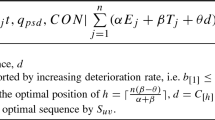Abstract
In the survey scheduling theory, if a surgical patient is regarded as a job waiting to be processed, and the anesthesiologist care unit nurses as machines that are needed before the survey. Due to the lack of operating rooms or the accidental extension of operation time, the patients will have a longer wait time, and can not do operation following the effects of the anaesthetic. The patient needs to be re-anesthesia so that the effects are required to undergo surgery. But this will cause operation time prolonged. Based on the performance of medical procedures under deteriorating health conditions, this paper presents a deterministic approach to schedule patients in surgery scheduling problems with the deferred parameter. We take the patients as jobs. By the deferred deteriorating effect, it means that the actual processing time of a job is a function of its starting time and a control parameter. We prove that the classical SPT (the shortest processing time) rule remains optimal when we minimize the makespan or the total completion time. For problems of minimizing the total weighted completion time and the maximum lateness, we present heuristic sequencing rules and analyze the worst-case bounds for performance ratios. We also show that these heuristic rules can be optimal under some agreeable conditions between the normal processing times and job due dates or weights.
Similar content being viewed by others
References
Browne S, Yechiali U (1990) Scheduling deteriorating jobs on a single processor. Oper Res 38:495–498
Cai J, Cai P (1998) On a scheduling problem of time deteriorating jobs. J Complex 14:109–209
Chan S, Wan Y, Cheung Y, Ng S, Wong M, Ng K (2005) Computed tomography findings in fatal cases of enormous hepatic portal venous gas. World J Gastroenterol 11(19):2953–2955
Cheng TCE, Ding Q (1998) The complexity of single machine scheduling with release times. Inform Process Lett 65(2):75–79
Cheng TCE, Wang G (2000) Single machine scheduling problems with learning effect considerations. Ann Oper Res 98:273–290
Gawiejnowicz S (2008) Time-dependent scheduling. Springer, Berlin
Graham RL, Lawler EL, Lenstra JK, Rinnooy Kan AHG (1979) Optimization and approximation in deterministic sequencing and scheduling theory: a survey. Ann Discrete Math 5:287–326
Gupta JND, Gupta SK (1988) Single facility scheduling with nonlinear processing times. Comput Ind Eng 14:387–393
Hsu VN, Matta R, Lee CY (2003) Scheduling patients in an Ambulatory Surgical Center. Nav Res Logist 50:219–238
Janiak A (1991) Exact and approximate algorithm of job sequencing and resource allocation in discrete manufacturing process. Wroclaw Technical University, Poland
Rinnooy Kan AHG (1976) Machine scheduling problems: classification. Complexity and computations. Nijhoff, Hague
Kise H, Ibaraki T, Mine H (1979) Performance analysis of six approximation algorithms for the onemachine maximum lateness scheduling problem with ready times. J Oper Res Soc Jpn 22:205–224
Kunnathur AS, Gupta SK (1990) Minimizing the makespan with late start penalties added to processing times in a single facility scheduling problem. Eur J Oper Res 47(1):56–64
Mosheiov G (1991) \(\vee \)-shaped policies for scheduling deteriorating jobs. Oper Res 39:979–991
Mosheiov G (1994) Scheduling jobs under simple linear deterioration. Comput Oper Res 21:653–659
Mosheiov G (1996) \(\varLambda \)-shaped policies for schedule deteriorating jobs. J Oper Res Soc 47:1184–1191
Ng CT, Cheng TCE, Bachman A (2002) Three scheduling problems with deteriorating jobs to minimize the total completion time. Inform Process Lett 81(6):327–33
Pinedo M (2008) Scheduling: theory algorithms and systems. Prentice-Hall, Englewood Cliffs
Smith WE (1956) Various optimizers for single-stage production. Nav Res Logist 3:59–66
Wu CC, Wu WH, Wu WH, Hsu P, Yin Y, Xu J (2014) Single-machine scheduling with a truncated linear deterioration and ready times. Inform Sci 256:109–125
Yu S (2014) An optimal single-machine scheduling with linear deterioration rate and rate-modifying activities. J Comb Optim. doi:10.1007/s10878-014-9739-8
Zhong L, Luo S, Wu L, Xu L, Yang J, Tang G (2014) A two-stage approach for surgery scheduling. J Comb Optim 27:545–556
Acknowledgments
The authors thank anonymous referees and editors whose comments helped to improve this paper. This work was supported by National Natural Science Foundation of China (11401065, 71371120, 61302180), the China Postdoctoral Science Foundation funded Project (2013M540698, 2014T70854), the Foundation of Chongqing Education Commission (KJ130606) and The Chongqing Municipal Science and Technology Commission of Natural Science Fund Projects (cstc2014jcyjA00003).
Author information
Authors and Affiliations
Corresponding author
Rights and permissions
About this article
Cite this article
Zhang, X., Wang, H. & Wang, X. Patients scheduling problems with deferred deteriorated functions. J Comb Optim 30, 1027–1041 (2015). https://doi.org/10.1007/s10878-015-9852-3
Published:
Issue Date:
DOI: https://doi.org/10.1007/s10878-015-9852-3



